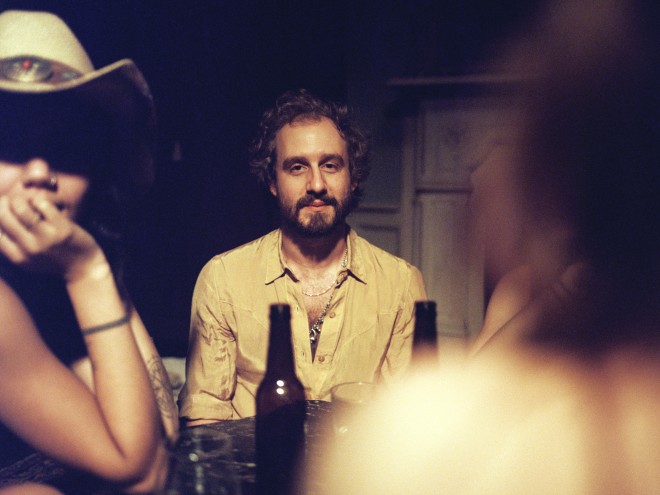Videos by American Songwriter
Brooklyn-based singer-songwriter Matthew Houck is back with Muchacho, his sixth album as Phosphorescent. Houck went down to Mexico on a whim to write the songs on Muchacho, amid a messy winter in New York where he lost his apartment and was going through a breakup. The album documents a period of heartbreak, and you can feel it on every track and often see it through the eyes of its mystical characters. “Found some fortune, found some fame,” Houck recounts of his journey on “Muchacho’s Tune.”
The album’s standout track is “Song For Zula,” where Phosphorescent’s burbling analog sound is at its most sublime. “See, honey, I am not some broken thing / I do not lay here in the dark waiting for thee / No my heart is gold. My feet are light / And I am racing out on the desert plains all night,” he tells his spurning lover.
The rest of Muchacho falls alongside the afternoon country-psych of Houck’s previous two records, 2009’s To Willie and 2010’s Here’s To Taking It Easy. “Let’s go for a ride,” he calls out on the jammy “Ride On / Right On.” “Now you tell me that my heart’s sick,” he admits on the Latin-tinged “Terror In The Canyon (The Wounded Master),” which features trumpet and violin. “You tell me that you’re leaving / and I’m telling you to go.”
We checked in with Houck to talk about what he’s been up to the last few years and find out if Muchacho is his Dylan-period Desire.
Phosphorescent has been pretty quiet over the last few years.
I took a break, you know. I had the luxury to be able to do that for the first time. I worked on building out my studio and fixing up some old analog gear that I’ve had for a while. I learned how to take apart things. Putting them back together was a little touch and go.
You went to Mexico to write and work on some of these songs. What drew you south? With the violin, this feels like it could be your Desire period.
I wouldn’t outright object to that idea, actually. That’s probably a true observation. It just kind of happened that way. It wasn’t like I picked Mexico with the idea of the sound of this record in mind. I found a really quick flight so I shot down there. I think [Mexico] did influence the sound of the record, more after the fact.
There are some interesting archetypes on this record: the wounded master, the slave, the muchacho. Who are these people?
I think part of that is out of the realm of biography. Those songs are third person, they’re characters. It’s not me so much. I don’t know if I have anything enlightening to say about that.
I see a lot of dichotomy on this album. Do you feel very conscious of that yin and yang in life right now?
During the writing, there was a clear line between darkness and light, would be a way to put it. Looking back at these lyrics, I see that pretty explicitly. It’s weird when you write these things, though, you’re not actually aware of what you’re doing, you’re not super conscious of it. A lot of times that stuff just comes out. It doesn’t reveal itself, even to me, until quite a bit later. But I notice that dichotomy.
I think there was a clear choice being handed to me about what to do, as far as giving in to whatever dark forces or maybe try to head back into the light.
Did you end up on the side of the light?
I think so. The record, it helped. It was a force towards the light. It’s a pretty dark record. I have a little distance to look at it, and I’m pretty aware it’s a pretty dark record. There were a couple conscious choices in the sense that the opening and closing themes being the sun arising. I wanted those to be clearly ascensions. It doesn’t start with a sunrise and end with a sunset. It starts with a sunrise and ends with a sunrise, again.









Leave a Reply
Only members can comment. Become a member. Already a member? Log in.